|
|
Tilbake
til første side Debattsiden
Golfreiser
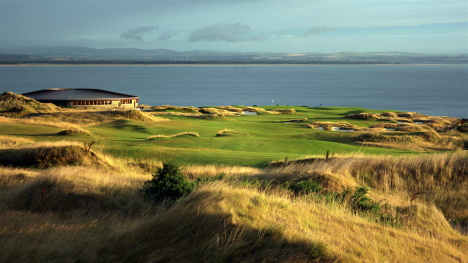
Castle Course 18th and the club house
04.03 SCOTLAND:
Golf and more..
Text: Louis Røren Photos: Louis Røren and Courses
Denne artikkelen om golf i Skottland bør du lese hvis
du ønsker gode ideer når du skal på golftur til Skottland
Anywhere you go in Scotland there are superb golf courses aplenty to be
played. Whether you choose North, South, East or West, the Highlands, Lowlands,
cities or coastal areas (especially), the number of courses, quality and
accessibility is unmatched anywhere.
Due to this plethora of choices it is impossible to play them all during a
time-limited visit. Hence, when going to Scotland for golf, it comes down to
making a choice of which area to go to. Over time I have visited them all,
except for the very North (North of the Highlands) though I know well that there
also are courses that rank amongst the best.
On this particular visit I brought a companion who had never been to
Scotland, and had a distinct desire to make the ‘pilgrimage’ to St Andrews, to
at least walk the Old Course and be photographed on the Swilken Bridge. Thus the
choice of visiting the East Coast/Fife County was a given.
As we had 10 days at our disposal we decided to spend some of them in
Aberdeenshire County (some 2 hours drive north of St Andrews), an area that
seems to go under the radar of many golf visitors to Scotland. Undeservedly so,
because there are several first rate courses in this county; courses like Royal
Aberdeen and Murcar Links, both old, classical links courses along the coastline
just outside the city of Aberdeen.
Only a mile or two further north lies Trump International, a modern links design
that ranks very highly in all polls. A small hour or so even further north lies
one of the quirkiest and most- fun-to-play golf courses you will find anywhere;
Cruden Bay.
After having played it the first time I found the course so special that I
failed to comprehend the genius of its design. For a long time I would swear
that this course broke every conventional wisdom of golf course design, features
like a blind par3, a par4 with sunken/blind green et al.
I have indeed changed my mind since then.
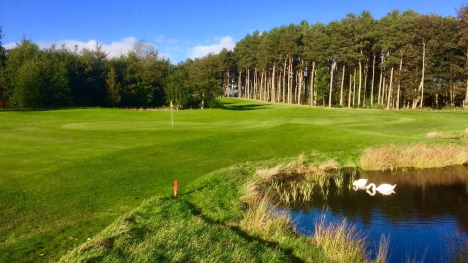
Meldrum House-banen
Meldrum House Country Hotel and Golf Course During our visit to
Aberdeenshire we elected to stay at Meldrum House, an exquisite castle/mansion a
small half hour northwest of Aberdeen, a place conveniently located to reach all
the aforementioned courses. And not only are the accommodations and the food
superb at Meldrum House, but so is its golf course.
This course must surely be one of the premier parkland layouts in Scotland. I
find no weak holes on this course and most of them are unique and a real
challenge. Therefore I can highly recommend playing it as an antidote to all the
links courses, even if you are not staying at Meldrum House.
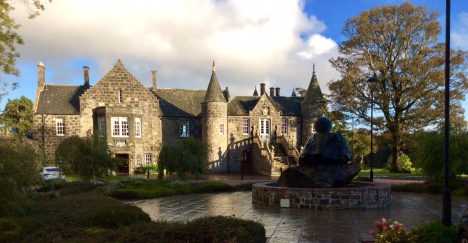
Meldrum House Country Hotel and Golf Resort
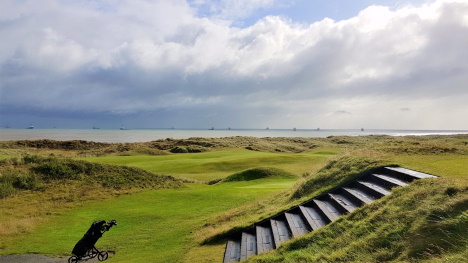
Murcar Golf Links
Murcar Links
As Royal Aberdeen is very private and rather choosy as to whom they allow to
play their revered and very private course, we were happy to instead visit Royal
Aberdeen’s next door neighbour, the welcoming and friendly Murcar Links.
Murcar Links is to many every bit as challenging as its more prominent neighbour
(in fact the courses are so close that you could hardly be faulted for walking
off Murcar’s 3rd green to the 5th tee box of Royal Aberdeen). And the story goes
that two fourballs of Japanese golfers playing Royal Aberdeen, after finishing
their 5th continued on to Murcars 4th and onwards. Two holes later they gave up
following the scorecards believing they had incorrect ones. Only when they had
finished their round at Murcar’s club house did they realize their mistake. It
is unknown if Royal Aberdeen compensated them in any way for their mishap, or if
they played their way back to the right club house. Either way they had
themselves one heck of a links golf experience.
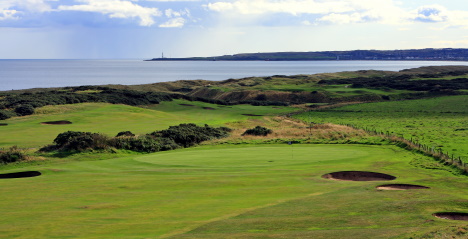
Murcar Links Hole 13.
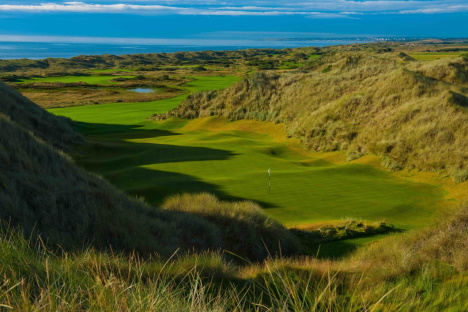
Hole 10 on Trump International
Trump International Aberdeen
The following day we had made an appointment with Trump’s staff at their, and I
have no better word for it; ‘fabulous’, golf course. This was my third visit,
and every time I come off this course exhilarated and joyful, and glad that I am
unprincipled enough not to let any antipathy for its owner keep me from playing
there. It is unique, beautiful, challenging, varied and simply a joy to play.
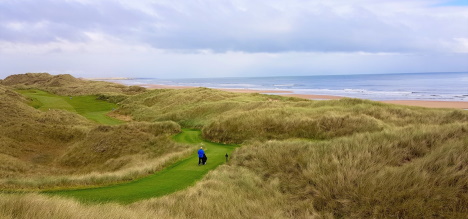
Trump International
Following our round of golf, a shower and luncheon, we drove south towards St
Andrews.
On the way I had a desire to revisit an old favourite, the historic Montrose
golf course, one of the oldest (1562) in the world, and quirky as they come.
We therefore drove along the old coastal road rather than the impressive though
uninteresting inland motorway. It was indeed nice to see the course in its good
old shape knowing that the North Sea keeps claiming a chunk of it every year.
When there we were happy however that we had not booked a tee time as now the
wind from the North Sea was so strong that we saw players having difficulties
keeping their balls pegged up when teeing off on the first.
Still, groups of local (?) players were lined up to play. A drive along this
coastline is not complete without visiting the sacred grounds of Carnoustie, to
this writer the hardest course there is. Masocists love it, I do not. As some
promo has it: ‘’a great big shaggy monster’’ or ‘Carnasty’ to some. There you
go. If you are scared to take it on, there is a second 18-holer that is much
friendlier.
A 30 minutes drive further south and you are in St. Andrews.
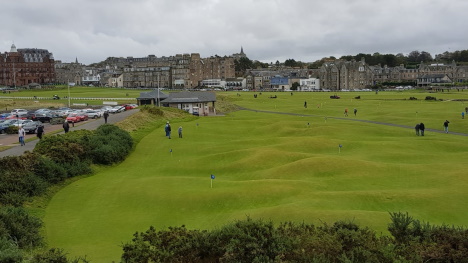
The local putting course on St. Andrews
ST. ANDREWS
Just say the words and the butterflies in every golfer’s stomach will start
fluttering.
In some ways I find it to be a rather peculiar reaction, in other
ways fully understandable.
The town is certainly charming with its old buildings
made out of grey granite, about 2 x par5s in length and 2 x par4s in width with
a historical (from 1152) cathedral ruin at the far end and a granite walled
portal making up the other end.
Seemingly the whole town is about golf, and to
some degree its old, extensive and renowned University. Bordering on the city
the 6 golf courses ’owned by the City and managed by R&A (Royal & Ancient) lie side by side on a
rather uninspiring flatland. Only the Jubilee Course, the one running closest to
the sea, has any exciting dunes to boast about. So clearly this fascination
about the place has not so much to do with geography as with years of mental
accumulations of adoring hype, the like of; The Home of Golf’, ‘Golf’s Mecca’,
‘World’s oldest golf course’, ‘the place every golfer needs to visit at least
once’. And it has become a must to be photographed on the Swilken Bridge, and at
least to walk (if not play) the Old Course . This is possible, as every Sunday
the Old Course is closed for play, giving primarily all residents of St Andrews,
but also visitors, the opportunity to freely roam the revered grounds (though
very costly if you leave any dog droppings).
The other 5 courses are open for
play every day of the week. In addition to walking the Old Course, it is also
recommendable to tour the town and visit the Golf Museum located just behind the
R&A club house.
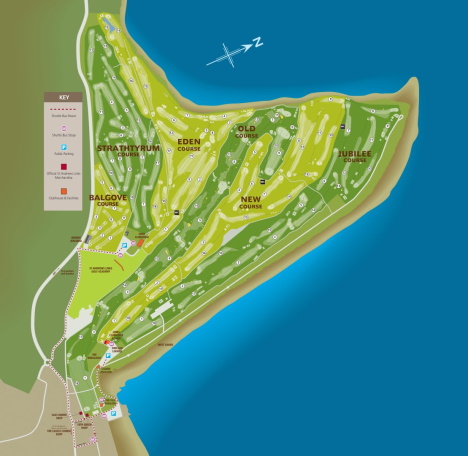
Map of the St. Andrew courses
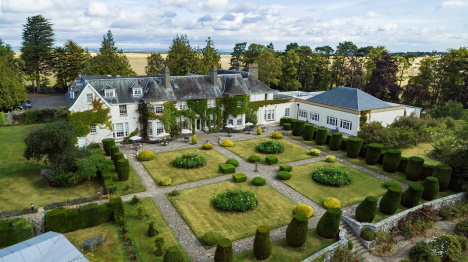
Rufflets
Rufflets Hotel St Andrews
Before touring the city we checked into our accommodations for the stay, the
lovely country house Rufflets Hotel, located on the outskirts of town, 4 minutes
drive from the first tee of the Old Course.
Rooms here are all individually
appointed in a homely fashion. The main restaurant serves up first rate meals
both for breakfast and dinner. We enjoyed it so much we decided to add an extra
night.
But, we really came here for some serious golf, 5 different courses in 5 days.
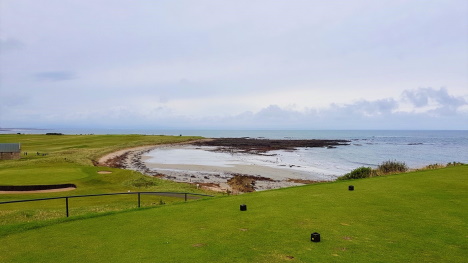
Crail Golf Links
Crail Golf Links
Our first round booked was at Crail Golf Club Balcomie
Links (has two 18 hole courses, the other being Craighead).
Crail GC is located
south from St Andrews, a small half hour drive to a weather-exposed part of the
coastline to the North Sea. The course was originally laid out in 1895 by the
local superhero Old Tom Morris and is a combination of stunning coastal views
and centuries of history. It is still fairly true to its original design playing
at par69 with 6xpar3s, 3xpar5s and 9xpar4s, with half its holes running along
the rough coastline. But it is a fallacy to think that short means easy, as many
longhitters will experience when they try to challenge some of the holes running
along the coastline.
This was my second visit, and will hopefully not be my
last.
Only a few minutes drive (6 km) on our way back to St Andrews we pass by one of
my absolute favourite courses anywhere, Kingsbarns Golf Links, where we are
booked to play the day after.
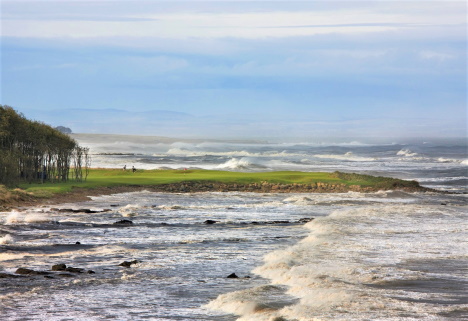
Hole 15 Kingsbarns
Kingsbarns Golf Links 2
Kingsbarns Golf Links lies along the same stretch of coastline as Crail, in fact
parts of the courses can be seen from the other.
Both courses played an
important role for the Royal Air Force during WW2. That is; Kingsbarns (named
after its nearby village) at the time was a 9hole golf course dating back to
1793 which had to be closed to be used for military purposes.
The current
Kingsbarns Golf Links was designed by the duo of Kyle Phillips and Mark Parsinen
and opened as late as in year 2000, though it seems like the course has always
been there.
It is laid out in a wide open terraced fashion with the North Sea
being highly visible from every hole and indeed affects play when wind is up.
Design wise the course has made outstanding use of its 2km long coastline, where
particularly hole 12 (a formidable par5) and 15 (a scary over water par3) stand
out and are two of my favourite holes anywhere.
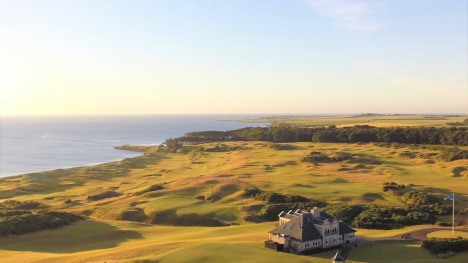
Kingsbarns - hole 9 and 18
On the same road going back towards St Andrews you will pass the classy Fairmont
St Andrews Resort with its two courses Kittocks and Torrance. Perched high on a
plateau overlooking the North Sea eastwards and St Andrews town to the north
this hotel and the two golf courses make for a very special place.
We decided to
pass it by this time in order to pay a visit to the next door course, The Castle
Course, belonging to R&A as its 7th course under their stewardship. This was to
be our venue for the day after.
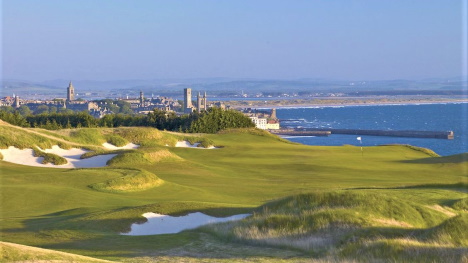
Castle Course - 6th green
Castle Course
This course demands some extra mentioning as it must be one of the more
controversial courses that has opened this side of year 2000.
Controversial
because of its (original) design, difficulty, and being R&A managed; a total break
from the other R&A courses. Locals, being links purists, loath it therefore,
calling it ‘the black sheep of the family’, and even more descriptive
expletives.
The course is located on the same plateau outside of town as the
aforementioned Fairmont courses, and though modern links in design it cannot be
defined as a real links course because of its location and lack of natural
dunes.

Castle Course 18th and the club house
Formerly the plateau was mostly potato fields, all flat and slanting
towards the sea. Today it is transformed into a moon landscape that seems to
have been like that forever.
I first played this course shortly after it opened in 2008, designed by the then
very young (born 1967) and ambitious Scotsman David McLay Kidd. McLay Kidd had
already made himself known for designing the first of the famed Bandon Dunes
courses in the US, and it is to be assumed that this was the reason for R&A
choosing him for this project.
Here he set out to make a statement. And making a
statement he did, in the sense that some of the features were so ‘outrageous’
that many found the course, especially the green areas, literally unplayable,
especially when the wind was acting up.
Playing it a few years later most of the
tricked up features had been modified, and had definitely become more playable.
This being my third visit I have to state that it now ranks amongst my favourite
courses almost on par with aforementioned Kingsbarns, even though Castle Course
is far more rugged and less polished. I state this despite not being able to
handle the winds on the day of visiting, and being solidly beaten by my +20 hcp
playing partner who was having great fun in the fairly gusty North Sea wind.
The
views, particularly over St Andrews town (and good parts of Fife) from green 6,
and the club house, are unbeatable.
This course has ‘nothing’ in common with the
other R&A courses, being located a few kilometres from the others and totally
different in all aspects, which is probably why the local seem so scornful of
it. Though not a true links course, it is true enough for me to strongly wishing
for many more repeat visits.
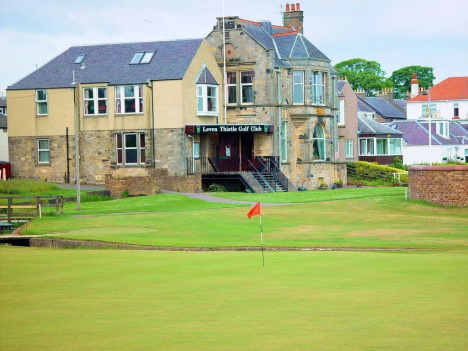
Leven Links
Leven Links Golf Course
A good halfhour’s drive over the hills from St Andrews lies the fjord named
Firth of Forth leading into Edinburgh from the North Sea. Alongside here are a
few highly reputable old links courses.
One of these is Leven Links, a very
traditional links course originally laid out in 1846 as a 9holer making Leven
Golfing Society one of the oldest golf clubs in the world.
In 1865 through 1868
Old Tom Morris made substantial changes to the old course and expanded it to 18
holes. Nine of these would in 1910 be ceded to a new kid on the block, Lundin
Golf Club, but has since been replaced, thus both courses currently have 18
holes. And as with the aforementioned Royal Aberdeen and Murcar Links, here you
can also easily make the mistake of involuntarily playing one of the courses and
somehow inadvertently continue on to the neighbouring course where the two
converge.
Leven plays to par 71 with a length of a modest 6550 yards, but as has
been remarked ‘the wind often laughs in the face of the yardage figures’.
It
turned out to be a very enjoyable round in modest wind, and with more time on
our hands we would gladly have taken on a round at the neighbouring Lundin
Course.
All this being said I was acutely aware that only a mile or two further
along the coast was being constructed a totally new course for opening the
summer of 2020, Dumbarnie Links, a course that is being heralded as the next
super course of the area of Fife, an area already full of them. A local hotel
executive told me that this course has the making of rivalling the other top
courses of the area. His opinion stemmed from an exclusive
preopening playing visit extended to the hospitality industry of the area
shortly before our visit.
When passing the site of the course it was impossible
to form an opinion as we were not allowed onto the premises and there was still
no clubhouse built, so this is now on the bucket list for our next visit which
will hopefully be soon.
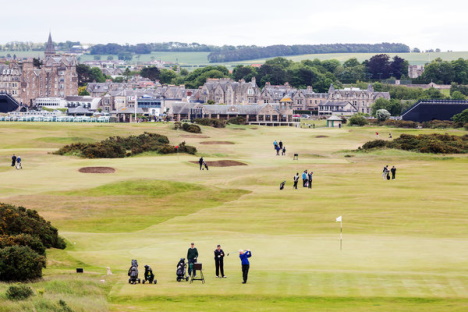
St. Andrews New Couse 1st tee
The New Course
But, we could not possibly have visited St Andrews without having played any of
the original 6 R&A courses. It had proven difficult to get onto to the Old
Course due to its popularity and somewhat antiquated booking/balloting
procedures. The New Course however presented no such problem.
The New Course St
Andrews is the oldest New course in the world, which is New only because it is
younger than the Old (1552 vs 1895). So being more than 100 years old, there is
nothing new about it and there is no denying that we very much felt like playing
on historical grounds.
Having played the Old Course twice on previous occasions,
without being overly impressed, I was much looking forward to playing the New. I
have talked to several golfers, inclusive of locals, that will swear that the
New provides a sterner test of golf than the Old.
Well, as the round proceeded I
found myself looking over at the Old (of which the front 9 holes run parallel to
the New’s front 8), and both seemed mostly flat and somewhat uninspiring, apart
from the green areas that are indeed challenging.
On the opposite side however,
direction the beach, runs the Jubilee Course in a much more undulated dunes
terrain. I found myself wishing that that was the course I was playing. I know
that this is like swearing in Church (and I still remember what that was like),
even so I cannot help but revealing my genuine on-site impressions.
Please do not let this in any way deter you from attempting to get on and play
any of the R&A courses.
To me however I am content to know that whenever I visit
Fife, St Andrews, again, I will not depend on the old R&A courses to have access
to world class alternatives.
|
|
|
|
|
|
